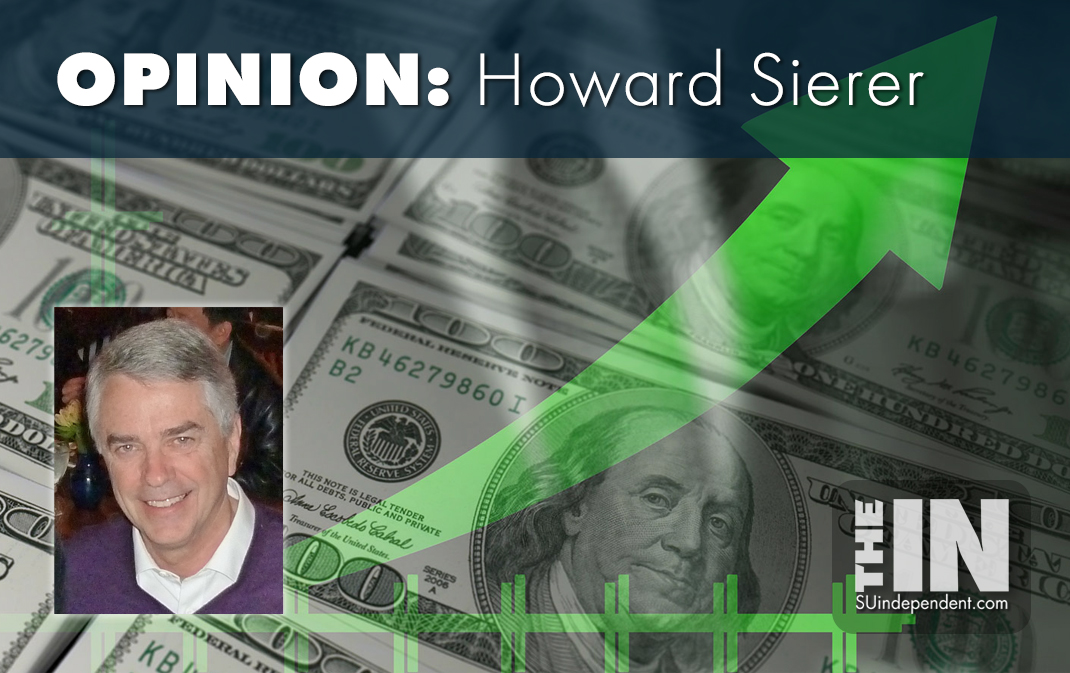
The Fastest Growing Part of the Federal Budget
– By Howard Sierer –
No, it’s not Medicare or Social Security or Medicaid or the Department of Defense. It’s something far less interesting to most of us but significantly more important: interest on the national debt.
According to the non-partisan Congressional Budget Office, we spent 44% more for net interest on the national debt from October to December 2022 than we did a year earlier. At that rate, we can expect to spend about $600 billion for the entire fiscal year. Compare that to Medicare’s $755 billion in 2022.
As of last May, the CBO expected interest payments over the next decade to grow at a 12% annual rate. Compare that to Medicare’s projected 7.2% growth rate, Social Security’s 5.6% growth rate, and Medicaid’s 5.6%.
At first glance, there’s not much difference between a 12% annual growth rate and Medicare’s 7.2% growth rate. But over ten years, interest payments will triple while Medicare’s federal outlays will double. Social Security and Medicaid will grow even less.
In fact, interest payments will grow even faster than the CBO’s May forecast for two reasons.
First, spendthrift Democrats enacted new programs that will be funded with even more debt: the $391 billion deceptively-named “Inflation Reduction Act” in July and the $1.7 trillion omnibus spending bill in December. Both added costly new on-going programs not included in the CBO’s forecast and as a result, the CBO’s forecast of $1.6 trillion annual federal budget deficits in each of the next ten years – deficits that can only be funded with new borrowing – is significantly too low.
Second, in order to keep interest rates abnormally low during the pandemic, the Federal Reserve bought the lion’s share of the Treasury Department’s new debt through last summer. When the Fed buys Treasury debt, it does so by creating money, the only government institution that can. (Look at the currency in your wallet: it all says “Federal Reserve Note” at the top.)
Economist Milton Friedman won a Nobel Prize for explaining what happens as a result. “Inflation is made in Washington because only Washington can create money, and any other attribution to other groups of inflation is wrong. Consumers don’t produce it. Producers and trade unions don’t produce it. Foreign sheiks and oil imports don’t produce it. What produces it is too much government spending and too much government creation of money and nothing else.”
To Friedman’s list, I would add that pandemic-caused supply-chain disruptions don’t cause inflation either. Instead, blame wildly-excessive Democratic pandemic handouts passed with no Republican votes and funded with Federal Reserve newly-created money. Excess cash plus fewer available goods equal inflation.
How has this looming fiscal disaster happened? An analogy at a personal level explains Democrats’ approach to spending.
As individuals, we may choose to buy goods and services using a credit card when we’re short of cash-on-hand. We want things now and we know we’ll have to repay later…with interest of course. The next month we find more things we want, buying them with our credit card and we’re only able to make the minimum monthly payment.
Continuing to spend more than we earn month after month, our outstanding balance grows and the interest portion of the minimum payment steadily increases. But unlike the Federal Reserve, we can’t create money to pay our bills, so sooner or later either we will have to reduce our spending and pay our debt or declare bankruptcy.
Congress could satisfy its spending addiction if it raised taxes each time it added a new program. But representatives who raise taxes often lose the next election. So, the prevailing attitude is spend now, get re-elected and retire from public office before the bill comes due.
Four years ago, I explained that your favorite programs would soon be crowded out of the federal budget. That day is fast approaching. Unless Democrats come to their senses – don’t hold your breath – a crisis is coming that will require some combination of major program cuts and dramatically increased taxes.
Its first manifestation is the looming battle over increasing the government’s debt limit. House Republicans want cuts in federal spending to accompany support for raising the debt ceiling above its current $31.4 trillion limit. The Biden administration and Congressional Democrats say no.
Vladimir Lenin explained what will happen eventually without a dramatic change in direction: “The way to crush the bourgeoisie is to grind them between the millstones of taxation and inflation.”



